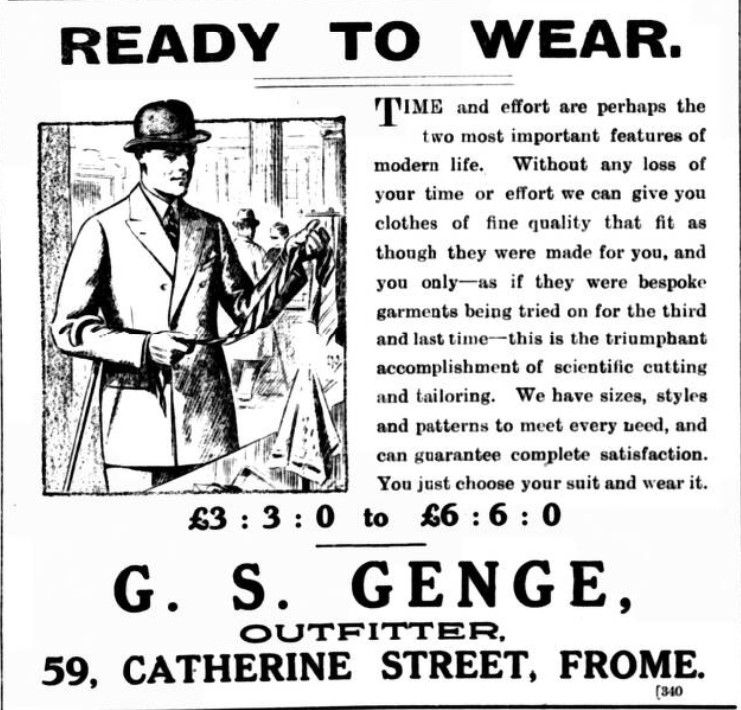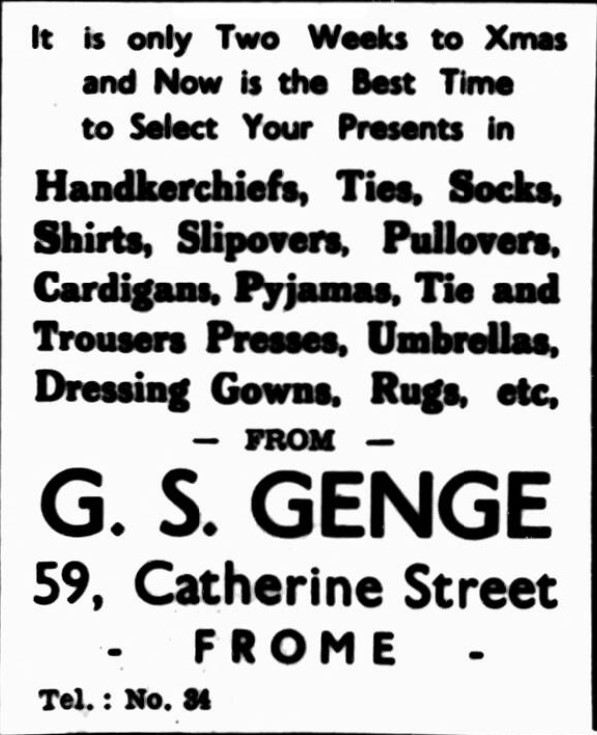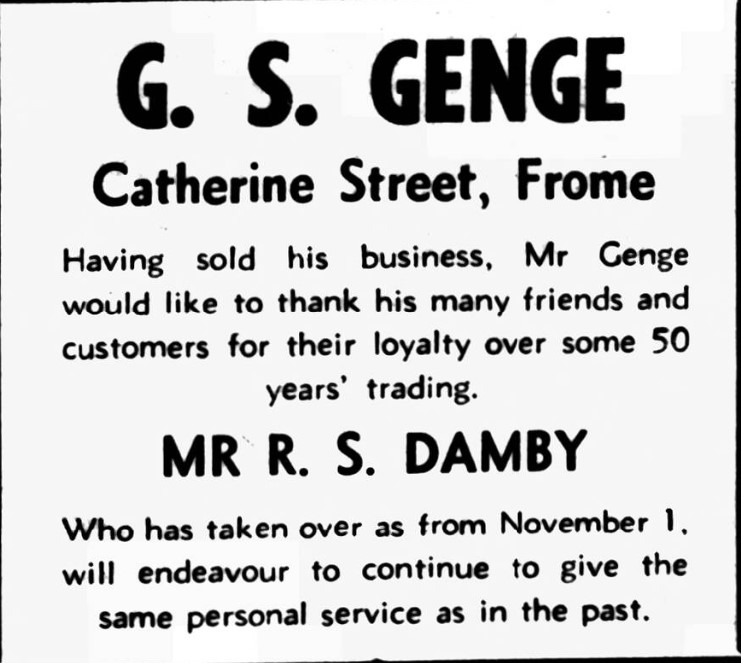Introduction
George Genge was the son of Abraham Genge, one of Hardington’s most significant nineteenth-century farmers. After marrying Elizabeth Francis Laver of Powerstock in 1875, George farmed at Pendomer, Mudford, Hardington, and Ilchester. His son, George Stanley, ran a men’s wear shop in Frome for many years. This article explores his life and finances, making extensive use of wills and grants of probate.
Birth
George Genge, the second child of Abraham and Elizabeth Genge, was born at Hardington in 1851. His father, Abraham, was a farmer.
Marriage
On 22 April 1875, George married Elizabeth Frances Laver, the daughter of Thomas and Elizabeth Laver, at Powerstock. The witnesses to the wedding were George’s sister, Sarah, and Elizabeth’s uncle, Frederick Lemon.
Wife
Elizabeth was the middle child in a family of five daughters. She was born and raised on a 440-acre farm run by her father and grandfather at Sutton Bingham. After her grandfather died in 1865, her father relocated the family to Mappercombe, Powerstock, two years later. Following her father’s death in 1873, her mother ran the Mappercombe Farm until she retired to Yeovil in the 1880s.
Pendomer
George occupied Pendomer Lower Farm from about 1875 to 1886. By April 1881, he farmed 287 acres and employed three men and four boys.
His tenure at the farm was marked by significant challenges, including two outbreaks of disease among livestock. In 1879, a case of typhoid fever led to the destruction of affected pigs, and in 1885, an outbreak of swine fever resulted in the slaughter of all pigs on the farm.[1]
In addition to his farming responsibilities, George served as a poor law guardian and overseer, indicating his involvement in local governance.[2]
In 1885, George gave notice of his intention to leave the farm, which was subsequently advertised as available to let from 6 April 1886.[3] The property comprised a farmhouse, dairy house and outbuildings, two cottages and the following land:
Homestead, gardens, etc. 2 3 14
Arable 61 2 21
Meadow 79 3 25
Pasture 137 3 13
Orchard 8 0 33
290 1 26
George held his sale on 10 February 1886, which included 76 cattle, three cart horses, 32 pigs, implements, and dairy utensils.[4]
Inheritances
George’s departure from Pendomer may have been influenced by his mother’s death on April 26, 1885.
When George’s father died in 1880, his estate was administered by his wife and his sons, Abraham and George. After his wife died in 1885, Abraham and George inherited their father’s estate subject to paying legacies amounting to £450. Their father’s estate was valued at “under £2,000,” so they probably inherited about £775 each.[5]
George’s mother left an estate valued at £195 6s 5d, most of which she divided between her son, George, and daughter, Sarah.[6]
Additionally, in 1884 or soon after, George’s wife may have inherited as much as £1,600 from her father (see appendix).
Mudford
After his time at Pendomer, George relocated to Mudford, entering into an annual tenancy at West Mudford Farm, which comprised 96 acres. His address at the time of proving his mother’s will in Taunton was recorded as Mudford.[7] His first child, George Stanley, was born in Mudford on March 2, 1888.
Hardington
From 1890 to 1891, George and his family resided at Moor Farm in Hardington, where his second child, Elizabeth, was born on April 7, 1890. On 20 March 1891, in anticipation of his next move, George advertised for a general servant to work in a farmhouse at Ilchester.[8]
Ilchester
In April 1891, they moved to Manor House in Ilchester, where their third child, Madoria Evelyn, was born on February 29, 1892.[9]
During this time, George was actively involved in parish affairs, serving as a churchwarden, a member of the Parish Council and School Board, and a trustee of the Ilchester Almshouse Charity and Town Trust.[10]
In June 1896, George was one of the farmers who provided wagons to convey members of the Ilchester and District Medical Aid Society to Yeovil to catch a train to Weymouth.[11]
Caring for extended family
George faced increased familial responsibilities when his mother-in-law, Elizabeth Laver, died on February 5, 1894. Not only did he administer her estate but he also took in her three orphaned grandchildren, Elizabeth, Thomas, and Bessie Laver, the children of his wife’s sister, Betsy. In her will, his mother-in-law left George a legacy of £40 “as an acknowledgement of services rendered me when I was in business.”[12]
Death
During the latter part of his life, George suffered from “Bright’s Disease,” a kidney-related ailment. Early in 1902, his doctor, Ptolemy Colmer, probably informed the family that George’s prognosis was terminal, prompting them to prepare for his impending demise. As part of these arrangements, on 5 March 1902, Palmers, the auctioneers, held a sale of hay, straw, oats and beans at the farm at short notice.[13]
George died at the Manor Farm, Ilchester, on 25 April 1902, aged 51, after a long and painful illness.[14] His body was taken to Hardington for burial. He left an estate with a gross value of £1,936 7s 6d and a net value of £1,173 14s 0d.[15]
Following his death, his three executors organised at least two sales. William Corpe, the auctioneer, held a sale of household effects, dairy utensils and livestock at Hardington for George’s executors on 30 April 1903.[16] On 8 August 1902, Messrs Palmer sold eight acres of wheat growing on the farm.[17]
Elizabeth’s later life
By April 1911, Elizabeth lived at 25 Kingston, Yeovil, with her two daughters, Elizabeth and Madoria, and two nieces, Elizabeth and Bessie Laver. Her son, George, was an assistant in a clothing shop in Croydon, while her nephew, Thomas Laver, lived with his wife in Manor Road, Yeovil.
In about 1920, Elizabeth went to live in Frome.[18] In June 1921, she lived at 7 Victoria Road, Frome, with her son, George, and daughter, Madoria. Her daughter, Elizabeth, worked in Yeovil as a milliner, staying with her cousin, George Genge, at Totnel, Leigh.
Elizabeth died at 7 Victoria Road, Frome, on 27 July 1939, aged 86, leaving an estate valued at £344 16s 5d.[19] Rev Sawyer conducted the funeral at Hardington on 31 July, and Arthur Edwards of Moor Farm, Hardington, was one of the mourners.[20]
Children
1888-George Stanley (served with the Royal Engineers in the First World War; ran a gent’s outfitting business at 59 Catherine Street, Frome);
1890-Elizabeth (milliner in Yeovil; never married; lived with Madoria by 1939; died at Radipole in 1972; buried at Hardington);
1892-Madoria Evelyn (married a policeman in 1922; died in 1949).
The will of George Genge
Executors and trustees: my wife, Elizabeth Francis Genge, my brother, Abraham Genge and Benjamin Dunn Penny of Yeovil, Draper.
My half share in the house, stable, coach house, garden, orchard and premises at Hardington Mandeville and now occupied by my said brother to my wife for life and then to my son, George Stanley Genge absolutely.
To my trustees: the remainder to convert to money and invest, with income to my wife for life and then to my children in equal shares (if they predecease me, their children to stand in their place).
Wit: solicitor and clerk.
George’s wife’s inheritance
Elizabeth was the middle child in a family of five daughters. In his will, her father directed his trustees to give his wife a legacy of £1,000 and divide the remainder equally between his daughters when the youngest attained 21.[21] The youngest daughter, Mary, reached 21 in 1884 and died unmarried the same year. The second youngest daughter, Alice Jane, died in 1883. As Mary died intestate, the residue of Thomas’s estate was probably divided equally between the surviving three daughters in 1884. The residue comprised the whole estate worth £6,000, less his wife’s legacy of £1,000 and a freehold house at North Cadbury. If we estimate the value of the freehold house as £200 and disregard expenses, each daughter inherited about £1,600 in 1884, less any amounts already advanced for her education or maintenance.
References
[1] Western Gazette 9 May 1879 p. 7; Southern Times and Dorset County Herald 25 December 1885 p.5.
[2] Western Gazette 1 April 1881 p.5; Western Gazette 6 April 1883 p.5; Dorset County Chronicle 10 April 1884 p 9.
[3] Western Gazette 21 August 1885 p.4.
[4] Pulman’s Weekly News and Advertiser 9 February 1886 p.4.
[5] The will of Abraham Genge, dated 6 September 1878, proved at Taunton on 20 December 1880.
[6] The will of Elizabeth Genge, dated 20 June 1881, proved at Taunton on 3 July 1885.
[7] The will of Elizabeth Genge, dated 20 June 1881, proved at Taunton on 3 July 1885.
[8] Western Gazette, 20 March 1891, p.4. The advert was placed by “Mr. G. Genge, Moor Farm, Hardington.” The following week, his wife placed a similar advert.
[9] The previous tenant, John Cox, held his farm sale on 31 March 1891 (Western Gazette, 20 March 1891, p.1); George was at the farm by 5 April 1891 (census).
[10] Western Chronicle, 2 May 1902, p.7.
[11] Langport & Somerton Herlad, 27 June 1896, p.8.
[12] The will of Elizabeth Laver, dated 2 April 1890, proved at Taunton on 4 July 1894.
[13] Western Gazette, 28 February 1902, p.1.
[14] Western Chronicle, 2 May 1902, p.7 and p.8; death certificate.
[15] The will and grant of probate of George Genge of Ilchester, yeoman, dated 5 March 1897, proved at Taunton on 15 July 1902.
[16] Western Chronicle, 24 April 1903, p.1.
[17] Western Gazette, 1 August 1902, p.1
[18] Somerset Standard, 4 August 1939, p.6.
[19] National probate calendar.
[20] Somerset Standard, 4 August 1939, p.6.
[21] The will of Thomas Laver of Powerstock, yeoman, dated 6 June 1870, proved at Blandford on 7 November 1873.
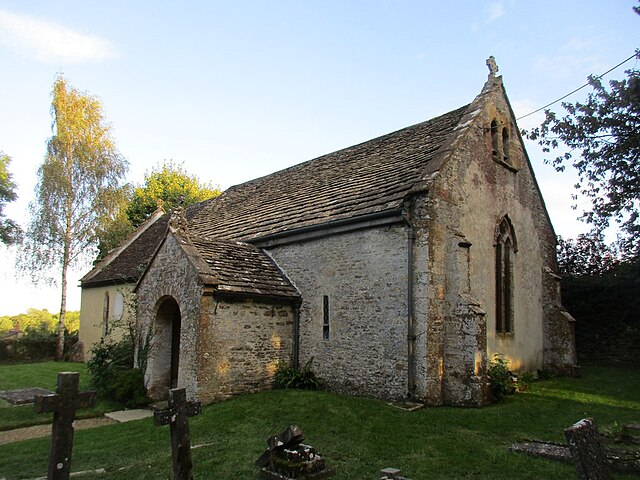
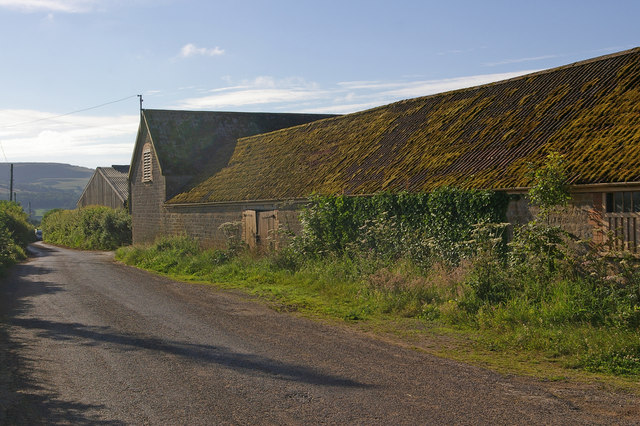
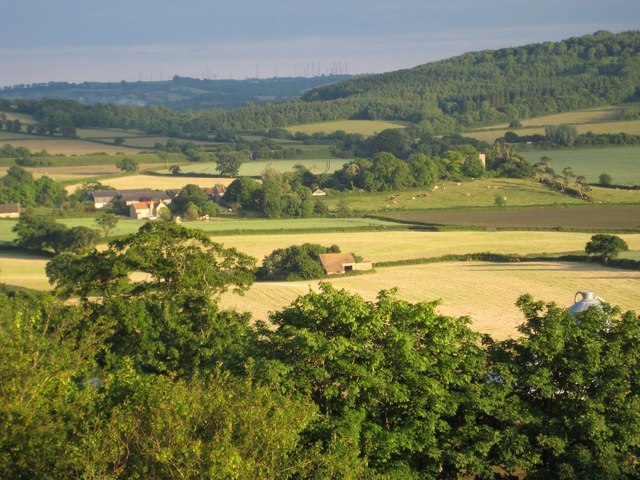
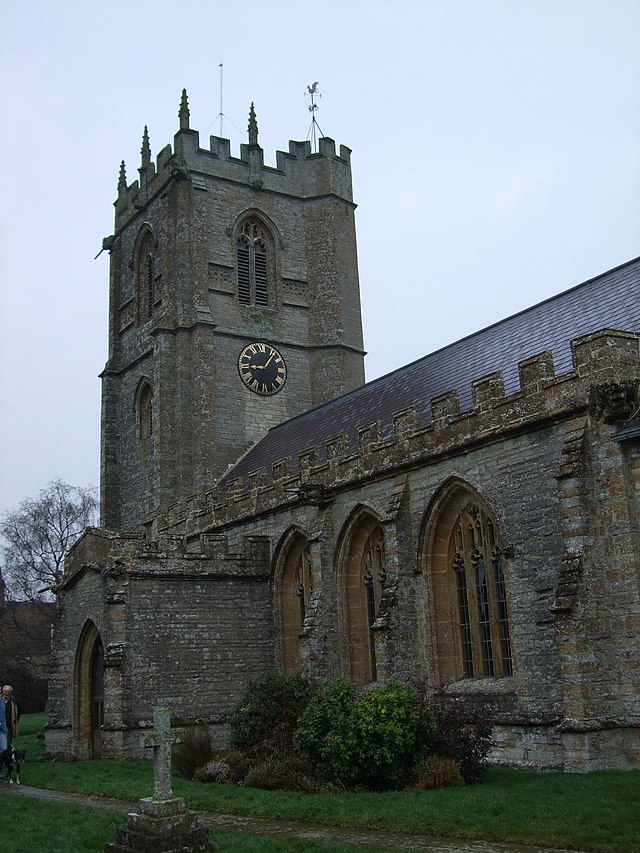
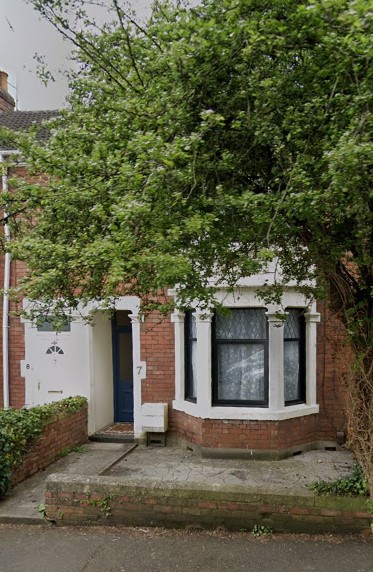
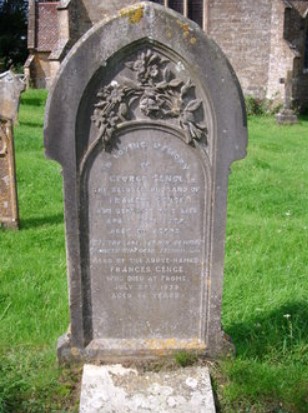
Adverts for G S Genge, the gentlemen’s outfitter shop in Frome owned by George’s son, George Stanley Genge.
